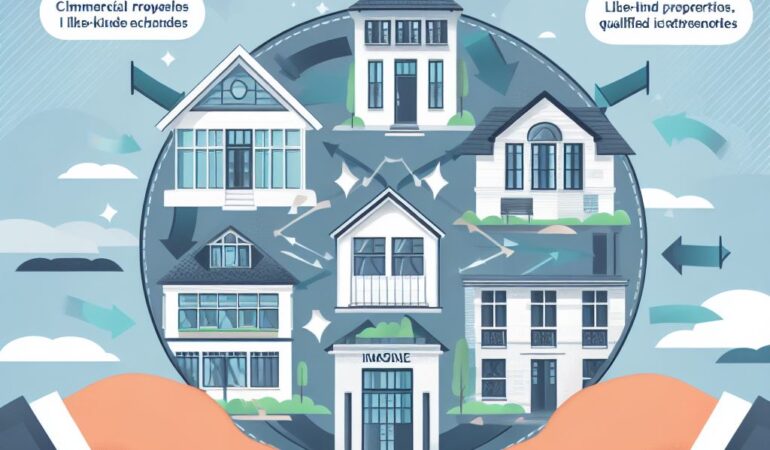Are you ready to take your commercial real estate investments to the next level? Look no further than mastering the 4 essential commercial real estate 1031 exchange rules.
In this article, we will dive deep into the intricacies of eligible properties, timeframe for identifying replacement property, qualified intermediaries, and tax implications.
Don’t miss out on this opportunity to gain valuable insights and stay ahead of the game in the ever-changing world of commercial real estate.
Key Takeaways
- Property must be held for productive use in a trade or business or for investment purposes, and both commercial and residential properties can qualify for a 1031 exchange.
- Exclusions from a 1031 exchange include personal residences, inventory, and property held primarily for sale, as well as certain types of property such as stocks, bonds, and partnership interests.
- The identification of replacement property must be done within a 45-day identification period, and there are rules regarding the number and value of properties that can be identified.
- A qualified intermediary (QI) is essential in a 1031 exchange, as they act as a middleman and ensure compliance with IRS regulations, including holding funds in a separate escrow account to prevent the taxpayer from having actual or constructive receipt of the funds.
Eligible Properties for 1031 Exchange
You frequently encounter questions about which properties you can exchange in a 1031 exchange. To be eligible for a 1031 exchange, the property must be held for productive use in a trade or business or for investment purposes. This means that both commercial and residential properties can qualify for a 1031 exchange, as long as they meet the criteria.
However, there are some restrictions. For example, personal residences, inventory, and property held primarily for sale don’t qualify for a 1031 exchange. Additionally, certain types of property, such as stocks, bonds, and partnership interests, are also excluded.
It’s important to remember that the property being exchanged must be like-kind to the property being acquired. This means that the properties must be of the same nature or character, even if they differ in grade or quality.
Now that you understand which properties are eligible for a 1031 exchange, let’s move on to discussing the timeframe for identifying replacement property.
Timeframe for Identifying Replacement Property
After determining which properties are eligible for a 1031 exchange, it’s important to understand the timeframe for identifying replacement property. This is a crucial aspect of the 1031 exchange process, as failing to comply with the timeline can result in disqualification from the tax benefits.
Here are the rules and guidelines for identifying replacement property within the specified timeframe:
- 45-Day Identification Period: You have 45 calendar days from the date of the property sale to identify the replacement property. This period starts on the day after the relinquished property is transferred.
- Three Property Rule: You can identify up to three potential replacement properties, regardless of their value. However, keep in mind that if you exceed the three-property limit, the total value of the identified properties can’t exceed 200% of the value of the relinquished property.
- 200% Rule: If you decide to identify more than three potential replacement properties, the total value of the identified properties mustn’t exceed 200% of the value of the relinquished property.
- Specificity of Identification: The identification must be in writing and include a clear description of each identified property. It’s advisable to consult with a qualified intermediary or tax advisor to ensure compliance with the specific requirements of the IRS.
Understanding the timeframe for identifying replacement property is crucial for a successful 1031 exchange. By adhering to these rules, you can maximize the tax benefits and successfully complete your exchange.
Qualified Intermediary and Escrow Requirements
To ensure compliance with the 1031 exchange rules and facilitate a smooth transaction, it’s essential to enlist the services of a qualified intermediary and meet the escrow requirements.
A qualified intermediary (QI) is a crucial component of a 1031 exchange. They act as a middleman between the buyer and seller, holding the funds from the sale of the relinquished property in a separate escrow account. This ensures that the taxpayer doesn’t have actual or constructive receipt of the funds, which is a requirement for a valid 1031 exchange.
When selecting a QI, it’s important to choose a reputable and experienced professional who understands the intricacies of the 1031 exchange process. They should have a deep understanding of the tax code and be able to guide you through the entire exchange, from the identification of replacement property to the closing of the transaction.
In addition to the QI, there are specific escrow requirements that must be met. The funds from the sale of the relinquished property must be held by a third-party escrow agent, who’ll release the funds to the seller of the replacement property upon closing. This ensures that the taxpayer doesn’t have access to the funds during the exchange period, further solidifying compliance with the 1031 exchange rules.
Tax Implications and Reporting Requirements
Once you have completed a 1031 exchange, it’s important to understand the tax implications and reporting requirements that come along with it. Failing to comply with these requirements can lead to penalties and potential legal issues.
Here are the key things you need to know:
- Capital gains tax deferral: The primary benefit of a 1031 exchange is the ability to defer capital gains tax on the sale of your commercial property. By reinvesting the proceeds into a like-kind property, you can defer the tax liability until you sell the new property.
- Depreciation recapture: While a 1031 exchange defers capital gains tax, it doesn’t defer depreciation recapture. If you have claimed depreciation deductions on the property being sold, you may be subject to recapture taxes upon the sale.
- Reporting requirements: To ensure compliance with the IRS, you must report your 1031 exchange on your tax return using Form 8824. This form provides details of the exchange, including the properties involved and the amount of gain deferred.
- Keep detailed records: It’s crucial to maintain thorough records of the exchange, including purchase and sale agreements, settlement statements, and any correspondence with the Qualified Intermediary. These records will be essential for reporting and potential audits.
Understanding the tax implications and reporting requirements of a 1031 exchange is vital for a successful transaction. Consulting with a tax professional can help ensure that you meet all the necessary obligations and maximize the benefits of your exchange.
Frequently Asked Questions
Can I Use a 1031 Exchange for Personal Property or Only for Commercial Real Estate?
Yes, you can only use a 1031 exchange for commercial real estate, not personal property. This is an important rule to understand when considering the tax benefits of a 1031 exchange.
Can I Use a 1031 Exchange to Buy a Property in a Different State or Does It Have to Be Within the Same State?
Yes, you can use a 1031 exchange to buy a property in a different state. It doesn’t have to be within the same state. This allows you to expand your real estate portfolio nationwide.
Are There Any Restrictions on the Type of Replacement Property I Can Choose in a 1031 Exchange?
There are restrictions on the type of replacement property you can choose in a 1031 exchange. It must be a like-kind property, meaning it must have a similar nature or character.
Can I Use a 1031 Exchange if I Have Multiple Investment Properties That I Want to Sell and Exchange for a Single Replacement Property?
Yes, you can use a 1031 exchange to sell multiple investment properties and exchange them for a single replacement property. This strategy allows you to consolidate your investments and potentially increase your overall returns.
What Happens if I Cannot Find a Suitable Replacement Property Within the Specified Timeframe for Identifying One in a 1031 Exchange?
If you can’t find a suitable replacement property within the specified timeframe for identifying one in a 1031 exchange, you may have to pay capital gains taxes on the sale of your original property.




